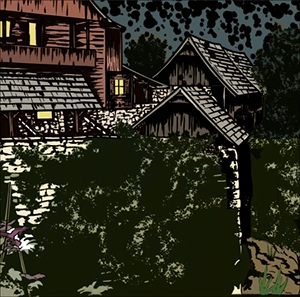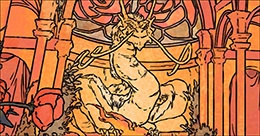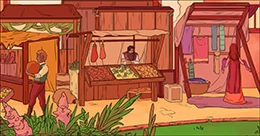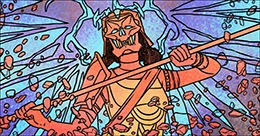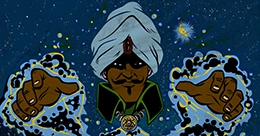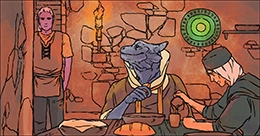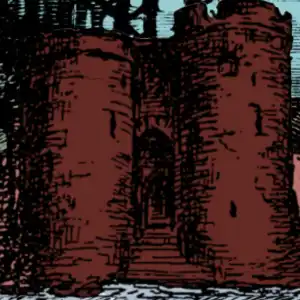Malkari

~ Matunas Tormontear
Song Stone titled "The Last Book," Library of Asundeai
Recorded circa 3,021 DA
Song Stone titled "The Last Book," Library of Asundeai
Recorded circa 3,021 DA
Description
The Malkari, a resilient race hailing from the desert world of the same name, embody a complex connection with the arid land they once called home. Enduring relentless heat and scarce drinkable water, they developed a lifelong respect for self-mastery. Through the teachings of the gods, Bako and Daruun, Malkari strive to attain enlightenment through the teachings of Bakodo, a path encompassing martial training, discipline, and spiritual growth. Standing at heights of 6 to 7 feet, these muscular people possess a tall upper torso with an additional pair of arms. Malkari weight varies significantly depending on dedication to physical fitness and height, befitting a race known for their formidable stature. Malkari reach adulthood in their late twenties and normally live around a century.
Societies
The Malkari people, renowned for their proud heritage, have interwoven societal structures that reflect their communal roots and cultivated history. All Dromarian Malkari are descendants of those who left their ancestral homeworld, with the majority of their population now residing in the Hush, the vast desert that stretches across the continent of Erimata. Kinderdales, close-knit communities found among the Malkari, typically consist of 30 to 200 individuals living together in villages or neighborhoods. The Malkari culture ingrains respect for elders and individuals with magical abilities. Those who teach foster a sense of unity through the Calling, guided by their deities, Bako and Daruun.
Kinderdales
Born from the need for survival, kinderdales emerged as the title for the nomadic bands, guided by the gentle flow of water through their barren world. Each kinderdale was a seedling sown in fertile soil, nurtured until the time was ripe to spread. When they found themselves in need of water, the Malkari would find their way to others, blending like rivers merging into a mighty current. These joint kinderdales became vibrant gardens of shared wisdom and spiritual growth, where the Malkari cultivated their heritage of enlightenment. After intermingling they would once again return to the land, budding once again. In the modern world, the term kinderdale encompasses any group of Malkari, whether wandering or settled. It represents not only their nomadic roots but also any gathering, from intimate circles to grand assemblies, where the threads of knowledge are woven, ensuring the flow of spirituality.
Bako, the god of discipline, martial arts, and self-mastery, holds great sway among most Malkari populations. The harsh desert lands of the Esh Republic serve as a prominent bastion of his faith. Additionally, many hold reverence for Daruun, the agricultural deity, particularly in farming, astronomy, and within individual cultural practices. Daruun's influence extends across various religions, with his role as a Saint of Harvest celebrated during planting and harvest seasons. Wherever a significant Malkari presence exists, Daruun is revered, exemplified by the strong dedication within the Esh Republic.
Amid Malkari society, a distinct community resides in Kalatearman, their Dromarian homeland on the continent of Zan'deil. These Malkari possess exceptional skills in tinkering and other crafts, spinning intricate contraptions and ideas that diverge from the conventional image of Malkari.
Malkari Traits
Ability Score Increase
Your Strength score increases by 2, and your Wisdom score increases by 1. Creature Type
You are a Humanoid. Size
Malkari typically stand between 6 to 7 feet tall and have muscular builds. Your size is Medium. Speed
Your base walking speed is 30 feet.

Malkari harvesting Grit Miter eggs.
Malkari have four arms and may use their extra limbs to wield additional weapons, carry a shield while leaving hands free, or whatever else you can imagine. This does not grant you additional attacks. Martial Discipline
Malkari have been mercenaries, warriors, and martial artists for as long as their society has existed. You gain proficiency in Athletics and your unarmed strikes deal 1d4 damage. Malkari Meditation
You have advantage on saving throws against being charmed or frightened. Warm Weather
Malkari are accustomed to harsh desert climates and are unaffected by the effects of hot weather. Languages
You can speak, read, and write Common and one other language of your choice.
History
To recount the history of the Malkari people is to speak of the gods among them, Bako and Daruun. Life on the planet Malkari was an unforgiving struggle, with scarce drinkable water posing a constant challenge. Amidst this adversity, a man named Bako emerged. He embraced self-mastery, fearlessly confronting the hardships that plagued his people. Bako's personal journey led him to attain what he termed "bala'neta," a state of transcendence and understanding. Realizing that true survival lay in uplifting the entire community, he dedicated himself to teaching others to master themselves. This mission empowered the Malkari to overcome their limitations and thrive together. Guided by instinct, Bako devised a comprehensive system called Bakodo, encompassing eight essential disciplines. This structured path provided every Malkari with guidance on their quest for bala'neta. Embracing Bakodo as a way of life and a unifying religion, the Malkari discovered solace, unity, and strength amid their harsh desert environment.
Among Bako's notable disciples, a skilled farmer named Daruun stood out. Through the teachings of Bakodo, Daruun achieved bala'neta, becoming the first student to attain the elevated state. With his newfound wisdom, he focused on cultivating sustainable food sources, sharing insights and practical knowledge that propelled the Malkari toward prosperity. Unbeknownst to them, the destiny of the desert-dwelling Malkari was entwined with the prophecies of Narwel, the goddess who ruled the seas and its inhabitants. Narwel foresaw a prosperous future but understood the need for resilience and resourcefulness to achieve it. United by a shared vision, Bako and Daruun embarked on a perilous journey guided by the whispers of destiny, eventually arriving at the mystic Grotto Fortuna. There, they encountered Narwel, who recognized their elevated spirits and gifted them a prophecy, serving as their guiding light. Upon returning, guided by Bako and Daruun, the Malkari defied the odds and survived Narwel’s test, a cataclysmic flood that raged across the planet. Finding refuge in an abundant desert oasis they named Plowman's Stein, the sanctuary stood against all odds. Within the Plowman's Stein, the Malkari flourished, embodying the teachings of Bakodo and the wisdom gained from their arduous journey. Unity became their defining trait as they forged a thriving community. However, their newfound abundance was not destined to endure. As time passed, the water that sustained them began to dwindle. This time, there was a greater purpose; the Ancestors arrived on Malkari seeking sustenance, requiring nourishment and rest. Bako dedicated precious time to the Ancestors, while others sought Narwel's wisdom, discovering that her prophecies transcended this world. A land with abundant food and water awaited, a place where all could be sustained. Entrusted by Narwel, the tritons departed early to secure the new world, while the land-dwelling Malkari chose to join the settlers, leaving their beloved leader Bako behind as he elected to remain. However, Daruun, the esteemed disciple, continued his journey with the settlers. On the new world, Daruun dedicated himself to the well-being of the early people. Sharing his knowledge and pioneering scientific theories on food production, he became revered across all religions and idolized by his people for his commitment to helping others. Throughout their history, the Malkari experience continued to be punctuated by displacement and migration. Originating from Kalatearman, they migrated to the desert they lovingly called the Stein on Pathriam. Then during the Age of Horror, they were forced to flee to Erimata, where they accepted the Dragon's Peace. There they established new kinderdales and societies. While some Malkari returned to Pathriam in subsequent years, the majority chose to remain, cherishing the resilience and unity that defined their remarkable journey.The Eight Disciplines of Bakodo
Power. Training the physical body and mastering martial practices.
Fortitude. Strengthening the mental and spiritual self through dedicated meditation.
Endurance. Surviving your environment and those who would seek to oppress.
Comprehension. Understanding your place in the universe, helping others to find theirs.
Conflict. Battle when it's necessary, keeping yourself as sharp as the edge of a blade.
Contemplation. Never grow comfortable, always seek to improve and better yourself.
Unity. Everyone is an individual. Uniting individuals makes an unstoppable force.
Tranquility. Retain calmness and centeredness in all things, and at all times.
Malkari Backgrounds
Here are a few Dromaria specific backgrounds associated with Malkari:
While these represent the largest Malkari societies, people from anywhere may have similar backgrounds.
The Agronomus
Homes across the world have a copy of the Agronomus, an ancient text attributed to the god Daruun. Handed down and rewritten through time, each new generation builds upon the guidance of the past, creating new recipes, farming techniques, and providing information about the local land.

A heirloom family copy of an Agronomus.
Variant Traits
If your campaign uses the optional rules from the 5e Player’s Handbook, your GM might allow these variant traits, any of which replaces your choice between the Martial Discipline or Malkari Meditation traits. Magical Fortitude
Your body is especially strong and able to withstand more than most. You have one additional attunement slot. Quick Fingered
Years of tinkering have led your hands to have exceptionally fast reflexes. You may use Sleight of Hand, Thieves Tools, or Tinker Tools, as a bonus action instead of an action.
Bala'neta
Bala'neta is the pinnacle of spiritual achievement within the teachings of Bakodo and represents the culmination of inner mastery. Among the eight disciplines, Bako himself considered Contemplation as the most crucial in attaining this enlightened state.
In his journey toward Bala'neta, Bako realized that survival was not solely dependent on personal strength but rather on the unity and resilience of the collective. He taught his disciples to embrace Contemplation, encouraging them to delve into the recesses of their minds, fostering a heightened awareness.
Practitioners of the Calling seek to establish their connection with the universe, a state similar to Bala'neta, regardless of the terminology they use.

Cultural Tidbits


While a majority of Malkari follow Bako's teachings, some choose to explore the world's vast frontiers or embrace solitary urban lifestyles. These rebels are referred to by traditionalists as "waywards."


Insects are a major part of most Malkari diets. A live catch is considered quite the delicacy.


The re-emergence of the tritons holds great significance for the Malkari. Having remained hidden beneath the depths for eons, their return sparks renewed connections and discoveries rooted in shared origins.


